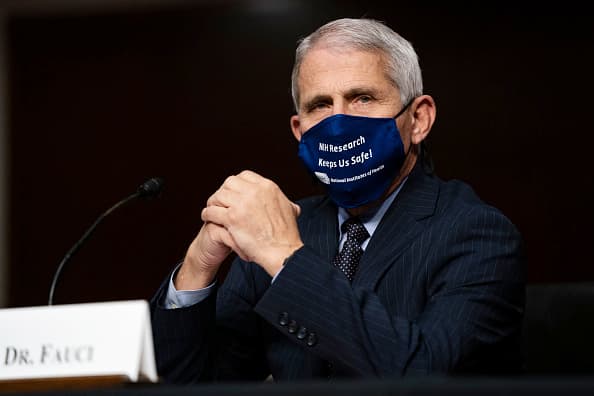Dr. Fauci says ‘help is on the way’ with vaccines, but doubts Covid can ever be eradicated

Dr. Anthony Fauci Testifies Before Senate On Federal Response To Pandemic
Alex Edelman | Getty Images
LONDON — White House coronavirus advisor Dr. Anthony Fauci on Thursday said a vaccine to bring an end to the pandemic now appears to be on the horizon, but warned it may not be enough to help eradicate the disease.
Speaking at a webinar event hosted by think tank Chatham House, the U.S.’s leading expert on infectious disease dismissed the idea that people may become complacent following a breakthrough in the race to deliver a safe and effective vaccine.
“I think the opposite… I really do” Fauci said. “The cavalry is coming but don’t put your weapons down, you better keep fighting because they are not here yet. Help is on the way, but it isn’t here yet.”
“So, to me, that is more of an incentive of please don’t give up. Don’t despair. The end is in sight, as opposed to: ‘Hey, we are good to go, don’t worry about anything.’ We are not good to go. We have got to continue to double down on public health measures,” he added.
Fauci’s comments come shortly after Pfizer and BioNTech said that early results showed their vaccine candidate was more than 90% effective in preventing Covid infections.
The vaccine efficacy was significantly higher than scientists had been hoping for. Fauci had previously said one that is 50% or 60% effective would be acceptable.
Huge challenges remain before a vaccine can be rolled out, but the development raised expectations that one could be delivered perhaps even before the end of the year.
It is hoped a vaccine could help bring an end to the coronavirus pandemic that has claimed over 1.28 million lives worldwide.
‘I doubt we are going to eradicate this’
The strong trial results from Pfizer and BioNTech come amid an upsurge of coronavirus cases that shows no sign of slowing.
In the U.S., newly confirmed infections are at all-time highs of well over 100,000 cases per day, with more than 1 million new cases reported nationwide in just the first 10 days of November.
At present, there are now 65,368 people hospitalized with the disease in the U.S., according to the Covid Tracking Project. That’s a record high and substantially more than reported during the respective peaks in April and July.
To date, the U.S. has recorded more than 10.4 million cases of the coronavirus and over 241,000 related deaths, according to data compiled by Johns Hopkins University.
“What needs to happen is a new way of communication that people can understand,” Dr. David Heymann, who led the WHO’s infectious disease unit during the SARS epidemic in 2002-2003, said during the same online session.
“Political leaders have political ambitions and the public health leaders and the technical leaders have ambitions on stopping the outbreak, and the two of those have to be reconciled in some way,” he continued.
“Countries have been promising vaccines, at least the political leaders, and that’s good but the public doesn’t understand all about vaccines … including that this disease may, even with vaccines, become endemic.”
A medical staff member treats a patient suffering from coronavirus in the COVID-19 intensive care unit (ICU) at the United Memorial Medical Center (UMMC) on November 10, 2020 in Houston, Texas.
Go Nakamura | Getty Images
When Fauci was asked how he interpreted his role in guiding the U.S. through the coronavirus crisis, the 79-year-old reflected on 36 years as director of the National Institute of Allergy and Infectious Diseases.
“We’ve been through a lot of things through that institute,” he said, citing its response to HIV, the 2001 anthrax attacks, Ebola, Zika virus, and pandemic flu, among others.
“I see my future as doing the same thing as we get our arms around this outbreak. We essentially put it to rest but, as David said, putting it to rest doesn’t mean eradicating it,” Fauci said, referring to Heymann’s comments.
“I doubt we are going to eradicate this. I think we need to plan that this is something we may need to maintain control over chronically. It may be something that becomes endemic, that we have to just be careful about,” he continued.
“Certainly, it is not going to be a pandemic for a lot longer because I believe the vaccines are going to turn that around.”




